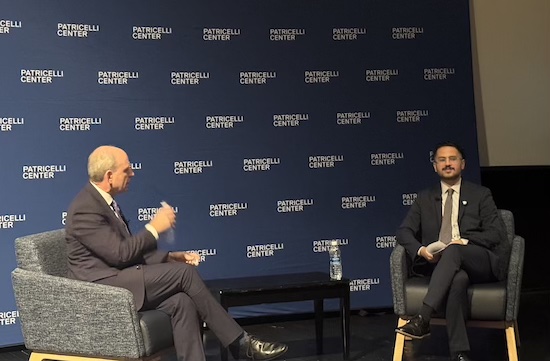
c/o Raiza Goel
On Thurs., Nov. 7, Permanent Representative of Ireland to the United Nations Fergal Mythen visited the University. His day began with lunch at the University Network of Human Rights House with Patricelli Center for Social Entrepreneurship Impact fellows, followed by a campus tour with Assistant Professor of the Practice in Public Policy and Patricelli Center Director Ahmed Badr ’20. He then visited “Leadership and Social Innovation” (CSPL252) for a Q/A with the Patricelli Fellows on topics ranging from the Irish Good Friday Agreement to the United Nations Security Council.
The conversation was organized as the flagship event of the Patricelli Center and an opportunity for the community to interact with the ambassador. The talk—which touched on ideas such as being action-oriented, ongoing conflicts and post-conflict regions, and yearning for peace—was attended by students and faculty. The ambassador drew on insights from his 30 years of experience in the field of diplomacy, including a career in the United Nations (U.N.), which began when Ireland was selected for a seat in the Security Council in 2021–22. Badr opened the talk by highlighting the Patricelli Center’s commitment to leadership as he transitioned to Mythen’s diplomatic career.
The ambassador emphasized the importance of taking concrete actions and building mechanisms for peacekeeping.
“Hope is not enough, yearning is not enough,” Mythen said. “It is how we go about building and sustaining peace through generations and conflicts that is the really important point. So hope without action, it’s just that, it’s just hope, it’s just a wish.”
He spoke further on the necessity for strong foundations and peace that would lead to, resilient economies, sustainable development, robust institutions, and functioning societies and provided Ireland as an example of how economies develop after peace processes.
“No, it’s not a coincidence that our economic development, our really strong economic take-off in the 1990s coincided with the take-off of the peace processes,” Mythen said. “Peace and development, peace and progress, peace and stability, go hand in hand. They are not either-or, they’re absolutely intertwined and essential.”
With rising global tensions fueling concerns about the relevance of the U.N., Mythen responded to the failure of the structure of the Security Council and related issues about representation.
“The fact that the permanent five are victors of the Second World War, it’s like it’s cast in the 1945 present, and yet the world of social difference today, we wonder, where is the permanent voice of Africa, where’s India, where’s Brazil, where’s the new world, where’s the Global South,” Mythen said.
Mythen also commented on the ongoing conflicts in the Middle East, the Russia-Ukraine war, and what the current landscape of the United Nations looked like amidst such turbulent times and briefly mentioned how visiting the University was an escape from that tense environment.
The talk concluded with follow-up questions; the ambassador addressed all attendees who wished to speak to him. Afterward, he had dinner with faculty and community members.
“For me, Ambassador Mythen coming to Wesleyan was a very inspirational moment,” attendee Naomi Ivie ’27 said. “I’ve had deep extracurricular involvements with Model U.N. and Model African U.N. in the past and having someone who literally represents the kind of peace we are trying to build in the world was inspirational not only in terms of peace-building but also the social innovation work that I hope to do in the future. It really made me think deeply about being a change-maker and whatever positions of power I hold.”
Raiza Goel can be reached at rgoel@wesleyan.edu.